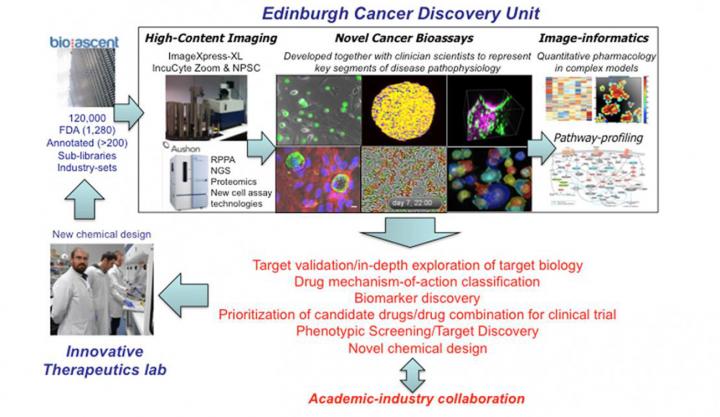Edinburgh Cancer Discovery Unit featured in “SLAS Discovery”
Editorial in a prominent drug discovery journal features CRUK Edinburgh Centre’s Edinburgh Cancer Discovery Unit and its phenotypic drug discovery activities: March 2019
Development of new therapeutics often begins with high-throughput screens for molecules that exert desired effects in in vitro model systems such as cultures of cancer cells or neuronal and other cell types. Such screens are essential for finding so called “lead compounds” before further studies can optimise them and ultimately bring them to the clinic. Historically, high-throughput screening was developed by the pharmaceutical industry and until the end of the 20th century was mainly carried out within its walls. In recent years however, it has been realised that academia based laboratories may be more flexible and innovative with development of early stage drug screening technologies, potentially increasing their cost-effectiveness and utility. This led to establishment of drug development and translational drug discovery units by leading academic institutions in several countries, including creation of the Edinburgh Cancer Discovery Unit (ECDU) in the Cancer Research UK Edinburgh Centre at the University of Edinburgh.
A recent issue of “SLAS Discovery”, a journal focusing on drug discovery sciences, features several cutting-edge academic drug discovery units and some of the scientific approaches they employ. It is most satisfying to see the ECDU listed in the journal’s editorial among other leading academic drug discovery centres from across the world. The editorial specifically highlights the expertise of the ECDU in advancing phenotypic drug discovery, which describes the application of new cell based assay technologies to identify hit and lead compound prior to knowledge of the drug target. In the issue the ECDU researchers also provide new insights into the application of high-throughput imaging and machine learning approaches to predict compound and drug mechanisms of action.
The ECDU has been established in 2011 and is a not-for-profit activity to provide a multidisciplinary group of core skills embracing advanced technology platforms and disease models, which drive innovations in oncology drug discovery and development. The ECDU mission is to develop and apply novel genetically defined 2D and 3D cell- and tissue-based assays that represent advances over the current state of the art in disease relevance and inform subsequent preclinical and clinical development strategies. The Unit, directed by Professor Neil Carragher, provides an open-access model to both internal University of Edinburgh research groups and external academic or industry organizations through either fee-for-service or joint research collaboration agreements. It works in close collaboration with several pharmaceutical and biotechnology industry partners and academic research groups to identify hit molecules, advance small-molecule lead generation, and classify compound mechanism of action through multiparametric high-content and pathway profiling. Key technologies used within the unit include high-content imaging, confocal and multiphoton confocal imaging, image analysis, reverse-phase protein arrays, and NanoString molecular profiling of transcriptomic and posttranslation pathway networks.
Note: For external enquiries on how to collaborate and access ECDU capabilities please contact Edinburgh Innovations; Email: edinburgh.innovations@ed.ac.uk
Related Links:
- Edinburgh Cancer Discovery Unit web-page
- Professor Neil Carragher group website
- “The Academic Pill: How Academia Contributes to Curing Diseases” - editorial in “SLAS Discovery”
- “Evaluation of machine learning classifiers to predict compound mechanism of action when transferred across distinct cell lines” – original research article from the Edinburgh Cancer Discovery Unit


